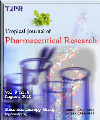
|
Tropical Journal of Pharmaceutical Research
Pharmacotherapy Group, Faculty of Pharmacy, University of Benin, Benin City, Nigeria
ISSN: 1596-5996
EISSN: 1596-5996
Vol. 14, No. 3, 2015, pp. 423-429
|
 Bioline Code: pr15056
Bioline Code: pr15056
Full paper language: English
Document type: Research Article
Document available free of charge
|
|
|
Tropical Journal of Pharmaceutical Research, Vol. 14, No. 3, 2015, pp. 423-429
| en |
Aralia elata  (Miquel) Seemann Suppresses Inflammatory Responses in Macrophage Cell by Regulation of NF-kappa B Signalling (Miquel) Seemann Suppresses Inflammatory Responses in Macrophage Cell by Regulation of NF-kappa B Signalling
Lee, Chong-Heon & Kang, Hyun
Abstract
Purpose: To investigate the antioxidant and anti-inflammatory effects of Aralia elata extract (AEE) in
lipopolysaccharide (LPS)-stimulated Raw264.7 cells.
Methods: Antioxidant activity was measured using 1, 1-diphenyl-2-picryl-hydrazyl (DPPH) radical
scavenging assay. Cell viability was evaluated using 3-(4, 5-dimethylthiazol-2-yl)-2, 5-
diphenyltetrazolium bromide (MTT) assay. RAW264.7 cells were stimulated with LPS to study protein
expression and production of inflammatory mediators, determined by Western blot analysis.
Results: AEE significantly inhibited DPPH-generated free radicals showing maximum inhibition at 40
μg/mL (p < 0.001). AEE alone did not exhibit any signs of cytotoxicity to RAW264.7 cells up to 200
μg/mL concentration. The LPS-induced increase in the production of nitric oxide was concentrationdependently
suppressed with half-maximal concentration (IC50) of 91.5 ug/ mL of AEE (p < 0.05 at 10
μg/mL, p < 0.01 at 20 μg/mL and p < 0.001 at 40 μg/mL, respectively). AEE also inhibited dosedependently
the LPS-induced increase in inducible nitric oxide synthase (iNOS) and cyclooxygenase-2
(COX-2) expressions with IC50 of 72.5 ug/ mL. Furthermore, the production of pro-inflammatory
cytokines, viz, tumor necrosis factor-α by LPS-stimulation in RAW264.7 cells was inhibited dosedependently
with IC50 of 34.9 ug/ mL by AEE pretreatment. Mechanistic studies revealed that AEE acts
by regulation of nuclear factor kappa-B signaling pathway in LPS-stimulated RAW264.7 cells.
Conclusion: This study shows, for the first time, that AEE possesses antioxidant and anti-inflammatory
effects and can be developed as a potential therapeutic agent for ameliorating macrophage-mediated
inflammation.
Keywords
Aralia elata; Anti-inflammatory activity; Macrophage cells; Inducible nitric oxide synthase; nuclear factor kappa-B signaling
|
| |
© Copyright 2015 - Tropical Journal of Pharmaceutical Research
Alternative site location: http://www.tjpr.org
|
|
